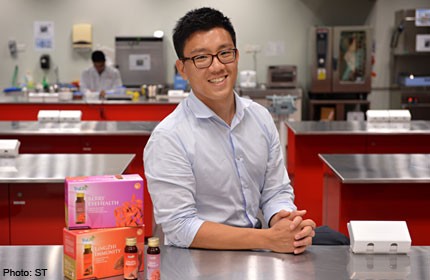TCM company tastes success with new drink

Chinese medicinal tonics are usually bitter and not everyone's cup of tea.
To make them more palatable for a greater number of consumers, traditional Chinese medicine (TCM) firm Poli Medical set out to make a less bitter potion.
The push was led by Mr Dylan Hu, 28, a director of Poli Medical, who joined the business two years ago. Poli Medical was established by his father 40 years ago.
The younger Mr Hu was keen to help the firm expand into the region with new products appealing to a wider consumer base.
So he worked with the Food Innovation Resource Centre (FIRC) at Singapore Polytechnic to develop a Chinese herbal tonic, called Ling Zhi Immunity.
The bottled tonic is now sold here and in the Philippines, Cambodia and Myanmar.
Mr Hu also wanted to develop an "East meets West" potion, which would use traditional Chinese herbs fortified with vitamins from Western medicine.
"Lingzhi is notorious for its pungency and bitterness. The challenge was to make it less bitter, and then add to its 'strength' with Western supplements like vitamin B1, B2, B6 and C, zinc as well as other Chinese herbs like red dates, longans and wolfberries," he said.
In the last two years, he worked with the centre to find the right level of bitterness.
After all, consumers familiar with Chinese tonics would not accept the product if it did not taste somewhat bitter like all traditional Chinese medicine, he said.
FIRC's food technologist Ruzaini Hashwam was nervous as he had never taken traditional Chinese medicine and had no idea what it would taste like.
"But in the end, this turned out to be an advantage because I could give better input," Mr Ruzaini said.
He took the time to learn about Chinese herbs and how to make traditional herbal tonics. He wanted to know how long herbs would boil before being ready to drink or before turning bitter.
Armed with the information, he then dived into the finer details of developing the immunity drink.
"My challenge was taste, texture and colour. Lingzhi has a dark colour which we could not change. But we looked at the vitamins and minerals that we could combine with it successfully before sourcing for them," said Mr Ruzaini.
Initially, he had problems with the vitamins and minerals to be added to the tonic as they gave it a different colour and taste. So he played with different combinations before arriving at the final formulation. Then came the challenge of manufacturing.
Said Mr Ruzaini: "It was one thing to create a process to make 200ml of the formulation in the laboratory and another to make 200 litres in a commercial plant. We had to play with the dosages to make sure the formulation worked."
Mr Hu added that with commercialisation, different problems emerged. He had to overcome glitches such as when filters in the equipment became choked because the product was not completely soluble.
"I also learnt that there are some herbs and powders that are difficult to dissolve in water. We had to pre-mix them before they were dissolved in water," he said.
Mr Hu's grandfather was a Chinese sinseh. His father started the business 40 years ago, using his grandfather's Chinese herbal recipes to make the Chinese herbal medicine tonics in his factory.
"The business was doing well, We had no debt, no problems. I was working with Deloitte Consulting, first in the US and then in Singapore, handling some life science clients," said Mr Hu.
"When I told my father that I was helping my clients to develop food products, he asked me to join the family business rather than help other companies."
Since Mr Hu joined the family business, he was keen to expand into the region, but needed new products. That was a key reason why he sought out the FIRC to develop the Ling Zhi Immunity drink.
The company, Mr Hu found, also had different certifications obtained from the Health Sciences Authority, including the Good Manufacturing Practice (GMP), meaning it was qualified to make TCM products.
"I know of only a handful of TCM companies that have this. I thought that we should make use of the GMP to make more TCM products," said Mr Hu.
Poli Medical used Spring Singapore's Innovation and Capability Voucher worth $5,000 to work on the project with FIRC.
chngkeg@sph.com.sg

Get a copy of The Straits Times or go to straitstimes.com for more stories.